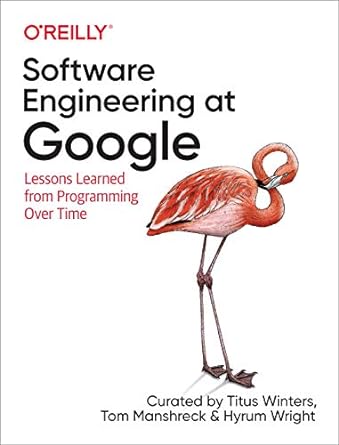In the ever-evolving field of software engineering, staying ahead of the curve is essential for career growth. One book that stands out as a valuable resource for both budding and experienced software engineers is Software Engineering at Google: Lessons Learned from Programming Over Time by Titus Winters, Tom Manshreck, and Hyrum Wright. This book offers an unparalleled glimpse into the engineering practices at one of the world’s leading technology companies, and it is packed with insights that can transform your approach to software development.
A Unique Perspective on Software Engineering
Google’s approach to software engineering is unique due to its scale and longevity. With tens of thousands of engineers working on a vast array of projects, Google has developed methodologies and tools that ensure its codebase remains sustainable and efficient over time. This book captures these practices and offers them in a format that is accessible and applicable to organizations of any size.
Key Takeaways for Career Growth
1. Understanding the Difference Between Programming and Software Engineering
The authors make a crucial distinction between programming and software engineering. While programming is about writing code, software engineering encompasses the entire lifecycle of code—from development and maintenance to deprecation. This holistic view is essential for engineers looking to build a sustainable career, as it emphasizes the importance of writing code that can adapt to changes over time.
2. The Importance of Teamwork and Culture
One of the standout sections of the book is its focus on teamwork and culture. Google’s success is not just about individual brilliance but about creating an environment where collaboration and knowledge sharing are prioritized. The book outlines practices such as blameless post-mortems, psychological safety, and the importance of humility, respect, and trust within teams. These insights are invaluable for any engineer looking to improve their team’s dynamics and productivity.
3. Best Practices in Code Review and Documentation
The book delves into the nitty-gritty of code review processes and the importance of thorough documentation. At Google, code review is not just a formality but a critical part of the development process that ensures code quality and facilitates knowledge sharing. The authors provide practical advice on how to conduct effective code reviews and maintain high standards of documentation, which are skills that are highly valued in any engineering role.
4. Engineering for Equity and Diversity
In today’s world, understanding and implementing practices that promote diversity and equity is crucial. The book addresses this by discussing how Google approaches these issues within its engineering teams. By building multicultural capacity and challenging established processes, Google creates an inclusive environment that fosters innovation and creativity. These lessons are essential for engineers and managers looking to build diverse and equitable teams.
Practical Applications and Tools
Beyond theoretical insights, the book provides practical applications and tools that can be adopted by engineers in their daily work. Whether it’s Google’s approach to version control, build systems, or continuous integration and delivery, the authors offer concrete examples and advice that can be tailored to fit various organizational needs.
Conclusion
Software Engineering at Google is more than just a book; it’s a comprehensive guide to building and maintaining robust software systems. By incorporating the lessons and practices detailed by Titus Winters, Tom Manshreck, and Hyrum Wright, software engineers can enhance their skills, improve their team’s performance, and ultimately, drive their career growth. Whether you are a new graduate or a seasoned professional, this book is a must-read for anyone serious about advancing in the field of software engineering.
By integrating the insights and methodologies from this book into your practice, you can position yourself as a forward-thinking engineer who is prepared to tackle the challenges of modern software development. Happy reading, and here’s to your growth and success in the software engineering field!


